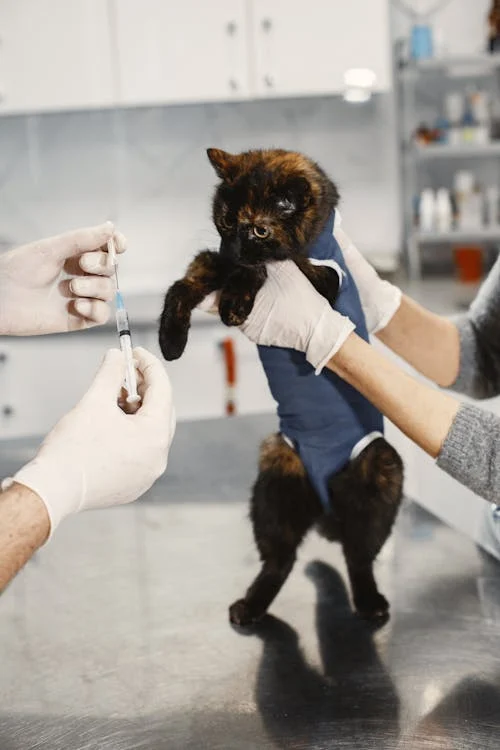
A key component of preventative healthcare for cats, vaccinations shield them from a number of dangerous and sometimes lethal illnesses. Like people, cats are susceptible to a variety of illnesses, many of which can be successfully avoided with prompt vaccination. Recognizing the value of immunizations benefits not only your feline friend’s health but also public health and the general health of the pet population. The important vaccinations for cats will be covered in this article, along with the differences between core and non-core vaccines, a suggested vaccination schedule, possible side effects, and teh significance of routine veterinary care in preserving your cat’s health.
Comparing Core and Non-Core Vaccines
Based on the seriousness and contagiousness of the diseases they prevent, cat vaccinations are typically divided into core and non-core vaccines, each of which has a distinct function. Because of the high danger of exposure and the seriousness of the diseases they guard against, core vaccinations are advised for all cats, regardless of their surroundings or way of life. The key vaccines are those for panleukopenia (FPV), calicivirus (FCV), and feline viral rhinotracheitis (FVR). These are frequently bundled into a single dose known as the FVRCP vaccine. These illnesses can cause serious health problems or even death and are very contagious. Conversely, non-core vaccines are suggested according to the unique risk factors, lifestyle, and geography of a cat. The vaccines for rabies, feline immunodeficiency virus (FIV), and feline leukemia virus (FeLV) are examples of non-core vaccines. Although rabies vaccination is frequently required by law, cats who live outdoors or in families with several cats are especially vulnerable to exposure and should have the FeLV and FIV vaccines. Making educated judgments regarding your cat’s medical care requires knowing the difference between core and non-core immunizations.
Suggested Immunization Schedule
To make sure your cat gets the required vaccinations at the right times, it is essential to set up a vaccination plan. The first dose of the FVRCP vaccine should be given to kittens between the ages of six and eight weeks. They will then receive additional doses every three to four weeks until they are roughly sixteen weeks old. During the crucial early phases of development, this first series aids in the establishment of a robust immune response. Depending on regional laws and policies, the rabies vaccination is normally given between the ages of twelve and sixteen weeks. Establishing a booster schedule is crucial after the first series; core vaccines are typically boosted every one to three years, but non-core immunizations may need more frequent boosters depending on the risk factors of the particular cat. To ensure your cat is up to date on their vaccinations nad to determine the proper vaccination regimen, routine veterinary checkups are essential. Cat owners can help shield they’re pets from avoidable illnesses and advance their general health and wellbeing by following a suggested immunization schedule.
Possible Adverse Reactions to Vaccination
Although immunizations are usually safe and effective, cat owners should be aware that they might occasionally have negative side effects. Localized swelling or discomfort at the injection site, minor sleepiness, or a slight decrease in appetite are examples of common, typically mild, side effects. These reactions usually go away in a day or two and dont mean that there is a major health issue. Rarely, though, more serious adverse effects could happen, like an allergic reaction that manifests as vomiting, facial or limb swelling, or trouble breathing. its critical to get in touch with your veterinarian right away if your cat displays any of these signs since your cat may need urgent care. Furthermore, some vaccines may carry a small risk of causing a vaccine-associated tumor, especially in cats that receive specific doses. It is crucial to talk to your veterinarian about your cat’s medical history in order to reduce the possibility of negative responses. Your veterinarian can assist you in choosing the best vaccination schedule. Cat owners may make better decisions and guarantee their pets receive the required vaccinations in a safe manner by being aware of any adverse effects.
The Function of Veterinary Medicine
The immunization procedure and your cat’s general health depend heavily on routine veterinary care. In addition to giving vaccinations, veterinarians are in charge of evaluating your cat’s health and identifying the required shots depending on personal risk factors. The veterinarian will assess your cat’s physical health, talk with you about any worries you may have, and provide you advice on immunizations and preventative care during routine checkups. Veterinarians can also assist in educating cat owners about the value of vaccinations and the possible repercussions of not vaccinating their pets. After a vaccine, they can also keep an eye out for any negative responses in your cat and, if necessary, give the right care. To make sure your cat gets the finest care possible possible and stays current on vaccinations and other preventive health measures, you must build a good relationship with your veterinarian. Cat owners can help shield their pets from avoidable illnesses and encourage a long, healthy life by making routine veterinary checkups a priority.
In conclusion
Because they shield cats from dangerous diseases and improve the general health of the pet population, vaccinations are a crucial component of preventive healthcare for cats. Making educated decisions regarding your cat’s health requires knowing the difference between core and non-core vaccines, following a suggested vaccination schedule, being mindful of any side effects, and appreciating the significance of routine veterinary care. You are taking proactive measures to protect your feline friend’s health and improve their quality of life by making sure they get the required vaccines. Being aware of your cat’s immunization requirements and collaborating closely with your veterinarian to create a thorough health plan are essential for responsible pet owners. IN the end, making immunizations and routine veterinary examinations a priority will help guarantee that your cat stays healthy and content for many years to come.